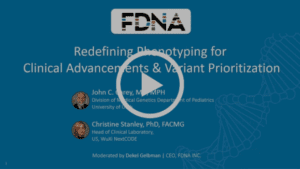FDNA and Microsoft Genomics are working together to integrate the most advanced Artificial Intelligence solutions to support clinical genomics. Combining next-generation phenotyping (NGP), with next-generation sequencing (NGS) enables today’s health and life science organizations to reach more thorough, accurate, and actionable results and improve healthcare outcomes. Microsoft Genomics and FDNA are empowering stakeholders to use AI, by building an ecosystem of best-of-breed AI-based genomics technologies on Azure.
The Age of AI
AI is a disruptive force in healthcare and is key to the future of precision medicine, but not without its pitfalls. As the saying goes—“garbage in garbage out”—rings true for the data inputs and outputs in AI solutions, and as addressed in The Wall Street Journal, “the need to amass sufficient training data is another limiting factor,” but it’s one that FDNA has already overcome.
FDNA’s flagship suite of products, Face2Gene, uses AI and NGP technologies (primarily DeepGestalt) to capture a variety of real patients’ phenotypic data from clinicians and link them to possible genetic variants that cause disease. Currently, 70% of the world’s geneticists, from over 130 countries are using these FDNA’s NGP technologies clinically, in addition to a large body of researchers, drug developers, and genetic testing labs working, collectively, to find answers and treatments for hundreds-of-millions of patients globally.
The Power of NGP
Genomic analysis is becoming the clinical standard in diagnostic evaluations due to its ability to cover thousands of biomarkers for diseases that are otherwise difficult to diagnose accurately and timely. The diagnostic power of such tests, however, is limited by the ability of clinicians to interpret the complex and overwhelming quantity of data generated through genomic sequencing.
Harnessing Microsoft’s cloud computing power and best practices variant analysis pipelines with FDNA’s NGP technologies allows for a deeper level of evaluation and understanding, and accurate results with fast turn-around times. NGP technologies aid in the translating of all relevant phenotypic data into actionable health insights significantly over any existing framework.

In the future, every person’s genome will serve as their medical record to guide health decisions. “The world is moving towards consumer genomics and precision medicine,” said Dekel Gelbman, CEO of FDNA. “Phenotyping using NGP technologies will help patients and their caregivers better understand their health and allow for more individually-tailored care plans and management—this is our role in the future of precision medicine.”
NGP as a Service
FDNA and Microsoft Genomics are working together to make NGP technologies available outside of Face2Gene to benefit a broad spectrum of life science companies. Studies have shown that when NGP technologies are combined with NGS analysis tools, the correct diagnosis ranks top 10 98% of the time, compared to the typical 41%, using NGS analysis data alone.[1]
NGP technologies have already been used to evaluate over 100,000 patients, and as this number continues to grow rapidly, FDNA expects to reach the one million patients mark over the course of the next couple of years.
Trent Norris, Senior Program Manager at Microsoft Genomics, added, “This collaboration with FDNA enables our healthcare customers to bring phenotypic and genotypic machine learning services to their front-line healthcare teams. Microsoft is honored to provide the secure, compliant infrastructure and supporting tools that are needed to handle these data-rich workloads. FDNA’s and Microsoft’s missions to unlock biological insights, find answers, and treatments bring us all closer to a more personalized ‘healthcare’ versus ‘disease care’ ecosystem.”
Clients interested in improving their genomic analysis pipelines can reach out to FDNA to learn more about how to integrate NGP technologies into their platforms.
[1] These studies were limited to cohorts of patients affected by monogenic disorders with unique facial attributes.



